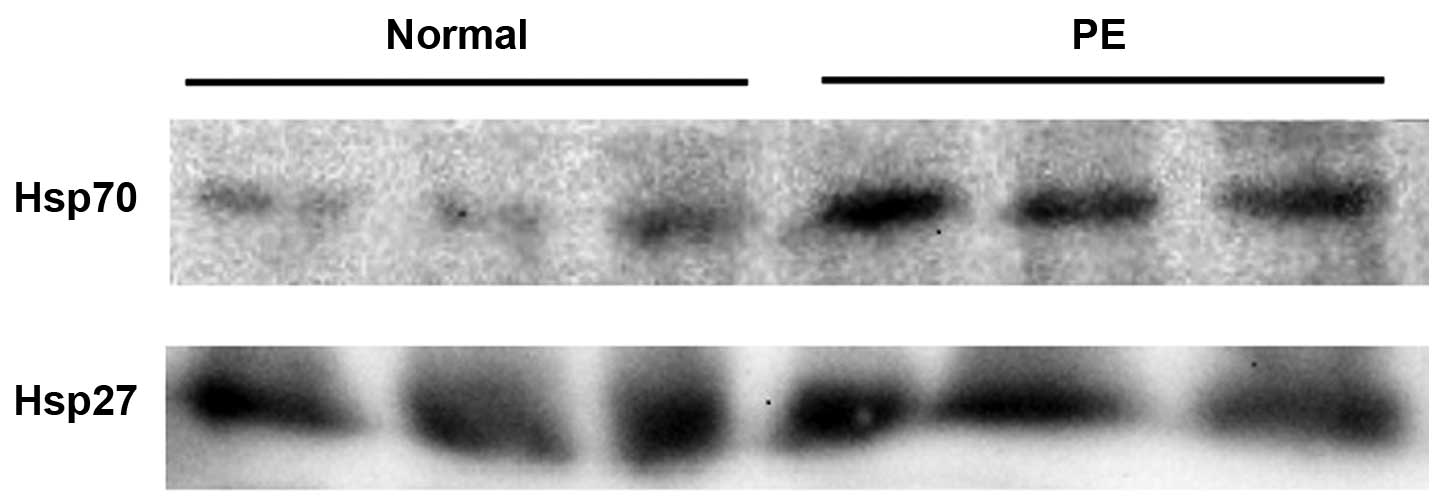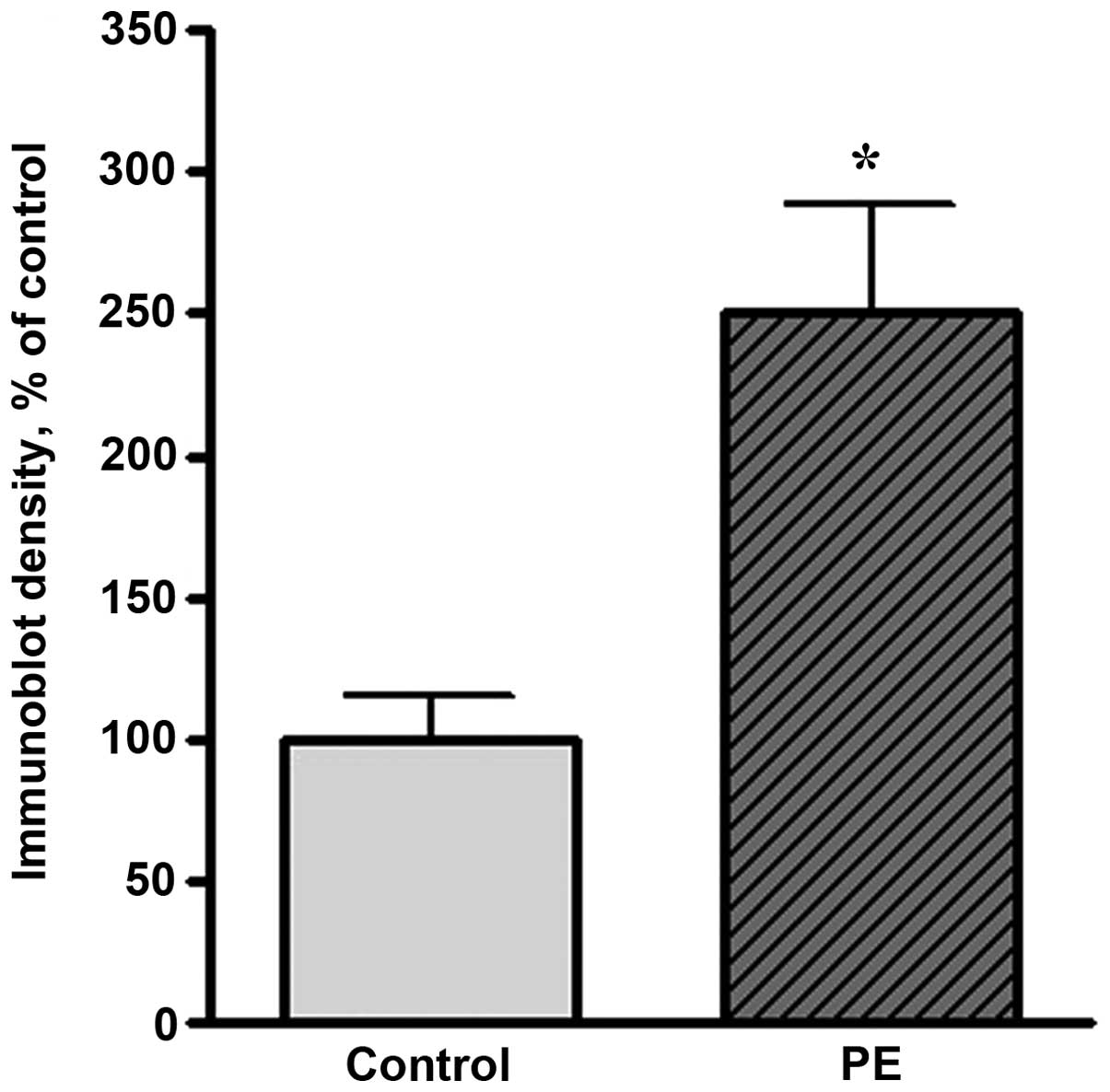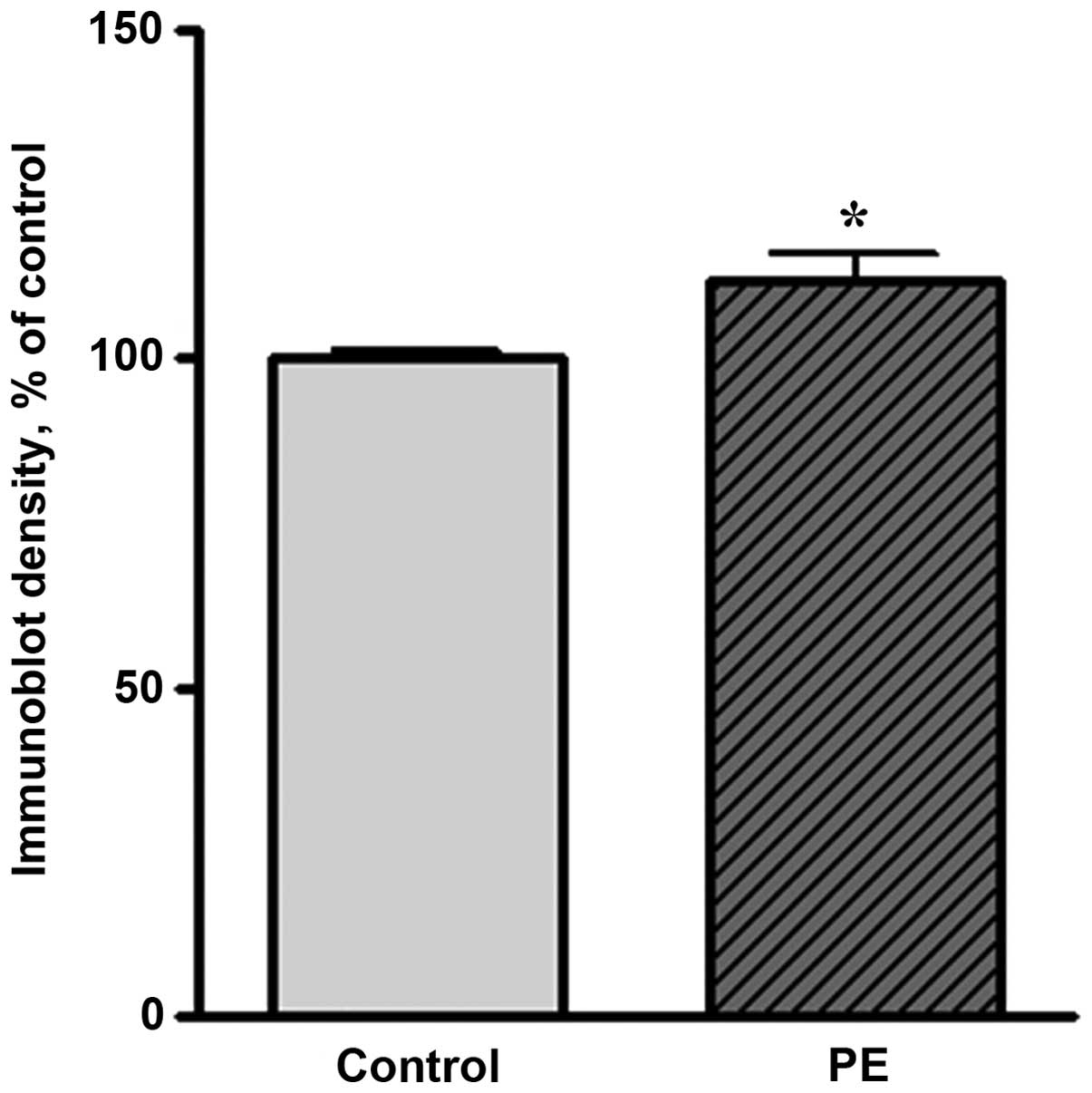|
1
|
Roberts JM and Cooper DW: Pathogenesis and
genetics of preeclampsia. Lancet. 357:53–56. 2001. View Article : Google Scholar : PubMed/NCBI
|
|
2
|
Salonen Ros H, Lichtenstein P, Lipworth L
and Cnattingius S: Genetic effects on the liability of developing
pre-eclampsia and gestational hypertension. Am J Med Genet.
4:256–260. 2000. View Article : Google Scholar
|
|
3
|
Nguyen Huu S, Dubernard G, Aractingi S and
Khosrotehrani K: Feto-maternal cell trafficking: A transfer of
pregnancy associated progenitor cells. Stem Cell Rev. 2:111–116.
2006. View Article : Google Scholar : PubMed/NCBI
|
|
4
|
Gussin HA, Bischoff FZ, Hoffman R and
Elias S: Endothelial precursor cells in the peripheral blood of
pregnant women. J Soc Gynecol Invest. 9:357–361. 2002. View Article : Google Scholar
|
|
5
|
Sugawara J, Mitsui-Saito M, Hoshiai T,
Hayashi C, Kimura Y and Okamura K: Circulating endothelial
progenitor cells during human pregnancy. J Clin Endocrinol Metab.
90:1845–1848. 2005. View Article : Google Scholar : PubMed/NCBI
|
|
6
|
Buemi M, Allegra A, D'Anna R, et al:
Concentration of circulating endothelial progenitor cells (EPC) in
normal pregnancy and in pregnant women with diabetes and
hypertension. Am J Obstet Gynecol. 196:68.e1–68.e6. 2007.
View Article : Google Scholar
|
|
7
|
Zeybek YG, Günel T, Benian A, Aydınlı K
and Kaleli S: Clinical evaluations of cell-free fetal quantities in
pre-eclamptic pregnancies. J Obstet Gynaecol Res. 39:632–640. 2013.
View Article : Google Scholar : PubMed/NCBI
|
|
8
|
Satterthwaite AB, Burn TC, Le Beau MM and
Tenen DG: Structure of the gene encoding CD34, a human
hematopoietic stem cell antigen. Genomics. 12:788–794. 1992.
View Article : Google Scholar : PubMed/NCBI
|
|
9
|
Davey DA and MacGillivray I: The
classification and definition of the hypertensive disorders of
pregnancy. Am J Obstet Gynecol. 158:892–898. 1988. View Article : Google Scholar : PubMed/NCBI
|
|
10
|
Bianchi DW, Zickwolf GK, Weil GJ,
Sylvester S and DeMaria MA: Male fetal progenitor cells persist in
maternal blood for as long as 27 years postpartum. Proc Natl Acad
Sci USA. 93:705–708. 1996. View Article : Google Scholar : PubMed/NCBI
|
|
11
|
Miraglia S, Godfrey W, Yin AH, et al: A
novel five-transmembrane hematopoietic stem cell antigen:
Isolation, characterization, and molecular cloning. Blood.
90:5013–5021. 1997.PubMed/NCBI
|
|
12
|
Yin AH, Miraglia S, Zanjani ED, et al:
AC133, a novel marker for human hematopoietic stem and progenitor
cells. Blood. 90:5002–5012. 1997.PubMed/NCBI
|
|
13
|
Ariga H, Ohto H, Busch MP, et al: Kinetics
of fetal cellular and cell-free DNA in the maternal circulation
during and after pregnancy: Implications for noninvasive prenatal
diagnosis. Transfusion. 41:1524–1530. 2001. View Article : Google Scholar : PubMed/NCBI
|
|
14
|
Luppi P, Powers RW, Verma V, Edmunds L,
Plymire D and Hubel CA: Maternal circulating
CD34+VEGFR-2+ and
CD133+VEGFR-2+ progenitor cells increase
during normal pregnancy but are reduced in women with preeclampsia.
Reprod Sci. 17:643–652. 2010. View Article : Google Scholar : PubMed/NCBI
|
|
15
|
Wilhelmi MH, Mertsching H, Wilhelmi M,
Leyh R and Haverich A: Role of inflammation in allogeneic and
xenogeneic heart valve degeneration: Immunohistochemical evaluation
of inflammatory endothelial cell activation. J Heart Valve Dis.
12:520–526. 2003.PubMed/NCBI
|
|
16
|
Mazzone A, Epistolato MC, De Caterina R,
et al: Neoangiogenesis, T-lymphocyte infiltration, and heat shock
protein-60 are biological hallmarks of an immunomediated
inflammatory process in end-stage calcified aortic valve stenosis.
J Am Coll Cardiol. 43:1670–1676. 2004. View Article : Google Scholar : PubMed/NCBI
|
|
17
|
Papp E, Nardai G, Söti C and Csermely P:
Molecular chaperones, stress proteins and redox homeostasis.
Biofactors. 17:249–257. 2013. View Article : Google Scholar
|
|
18
|
Molvarec A, Prohászka Z, Nagy B, Szalay J,
Füst G, Karádi I and Rigó J Jr: Association of elevated serum
heat-shock protein 70 concentration with transient hypertension of
pregnancy, preeclampsia and superimposed preeclampsia: A
case-control study. J Hum Hypertens. 20:780–786. 2006. View Article : Google Scholar : PubMed/NCBI
|
|
19
|
Fukushima A, Kawahara H, Isurugi C, et al:
Changes in serum levels of heat shock protein 70 in preterm
delivery and preeclampsia. J Obstet Gynaecol Res. 31:72–77. 2005.
View Article : Google Scholar : PubMed/NCBI
|
|
20
|
Shin JK, Jeong YT, Jo HC, et al: Increased
interaction between heat shock protein 27 and mitogen-activated
protein kinase (p38 and extracellular signal-regulated kinase) in
pre-eclamptic placentas. J Obstet Gynaecol Res. 35:888–894. 2009.
View Article : Google Scholar : PubMed/NCBI
|
|
21
|
Cunningham FG, Leveno KJ, Bloom SL, Hauth
JC, Gilstrap LC III and Wenstrom KD: Hypertensive disorders in
pregnancyWilliams Obstetrics. 22nd. McGraw Hill; New York: pp.
761–808. 2005
|
|
22
|
Lindheimer MD, Roberts JM and Cunningham
FG: Prevention of preeclampsia and eclampsiaChesley's Hypertensive
Disorders in Pregnancy. 3rd. Elsevier (Academic Press); San Diego,
CA: pp. 213–226. 2009
|
|
23
|
Majka M, Janowska-Wieczorek A, Ratajczak
J, et al: Numerous growth factors, cytokines, and chemokines are
secreted by human CD34+ cells, myeloblasts,
erythroblasts, and megakaryoblasts and regulate normal
hematopoiesis in an autocrine/paracrine manner. Blood.
97:3075–3085. 2001. View Article : Google Scholar : PubMed/NCBI
|
|
24
|
Peichev M, Naiyer AJ, Pereira D, et al:
Expression of VEGFR-2 and AC133 by circulating human
CD34+ cells identifies a population of functional
endothelial precursors. Blood. 95:952–958. 2000.PubMed/NCBI
|
|
25
|
Jászai J, Fargeas CA, Florek M, Huttner WB
and Corbeil D: Focus on molecules: Prominin-1 (CD133). Exp Eye Res.
85:585–586. 2007. View Article : Google Scholar : PubMed/NCBI
|
|
26
|
Lo YM, Zhang J, Leung TN, Lau TK, Chang AM
and Hjelm NM: Rapid clearance of fetal DNA from maternal plasma. Am
J Hum Genet. 64:218–224. 1999. View
Article : Google Scholar : PubMed/NCBI
|
|
27
|
Hahn S, Gupta AK, Troeger C, et al:
Disturbances in placental immunology: Ready for therapeutic
interventions? Springer Semin Immunopathol. 27:477–493. 2006.
View Article : Google Scholar : PubMed/NCBI
|
|
28
|
Carty DM, Delles C and Dominiczak AF:
Novel biomarkers for predicting preeclampsia. Trends Cardiovasc
Med. 18:186–194. 2008. View Article : Google Scholar : PubMed/NCBI
|
|
29
|
Zhong XY, Gebhardt S, Hillermann R, Tofa
KC, Holzgreve W and Hahn S: Parallel assessment of circulatory
fetal DNA and corticotropin-releasing hormone mRNA in early- and
late-onset preeclampsia. Clin Chem. 51:1730–1733. 2005. View Article : Google Scholar : PubMed/NCBI
|
|
30
|
Sifakis S, Zaravinos A, Maiz N, Spandidos
DA and Nicolaides KH: First-trimester maternal plasma cell-free
fetal DNA and preeclampsia. Am J Obstet Gynecol. 201:472.e1–472.e7.
2009. View Article : Google Scholar
|
|
31
|
Horinek A, Korabecna M, Panczak A, et al:
Cell-free fetal DNA in maternal plasma during physiological single
male pregnancies: Methodology issues and kinetics. Fetal Diagn
Ther. 24:15–21. 2008. View Article : Google Scholar : PubMed/NCBI
|
|
32
|
Pomyje J, Zivný J, Sefc L, Plasilová M,
Pytlík R and Necas E: Expression of genes regulating angiogenesis
in human circulating hematopoietic cord blood
CD34+/CD133+ cells. Eur J Haematol.
70:143–150. 2003. View Article : Google Scholar : PubMed/NCBI
|
|
33
|
Matsubara K, Abe E, Matsubara Y, Kameda K
and Ito M: Circulating endothelial progenitor cells during normal
pregnancy and pre-eclampsia. Am J Reprod Immunol. 56:79–85. 2006.
View Article : Google Scholar : PubMed/NCBI
|
|
34
|
Bauriedel G, Jabs A, Skowasch D, et al:
Dendritic cells in neointima formation after rat carotid balloon
injury. Coordinated expression with anti-apoptotic Bcl-2 and HSP47
in arterial repair. J Am Coll Cardiol. 42:930–938. 2003. View Article : Google Scholar : PubMed/NCBI
|
|
35
|
Banchereau J, Briere F, Caux C, et al:
Immunobiology of dendritic cells. Annu Rev Immunol. 18:767–811.
2000. View Article : Google Scholar : PubMed/NCBI
|
|
36
|
Ekambaram P: HSP70 expression and its role
in preeclamptic stress. Indian J Biochem Biophys. 48:243–255.
2011.PubMed/NCBI
|
|
37
|
Shin JK, Jeong YT, Jo HC, et al: Increased
interaction between heat shock protein 27 and mitogen-activated
protein kinase (p38 and extracellular signal-regulated kinase) in
pre-eclamptic placentas. J Obstet Gynaecol Res. 35:888–894. 2009.
View Article : Google Scholar : PubMed/NCBI
|

















